
Find some great books to help develop a growth mindset with your students!

Find some great books to help develop a growth mindset with your students!

The following document contains everything you need to get started with Learner Profiles. Suggested inventories and resoures are included by grade grouping. Section 1 - Getting Started...Read This First (really...read this first!);Secton 2 - Kindergarten to Grade 2 Resources;Section 3 - Grade 3 to 5 Resources;Section 4 - Grade 6 to 9 Resources;Section 5 - Grade 10 to 12 Resources;Section 6 - How to Build a Learner Profile;Section 7 - Now What?
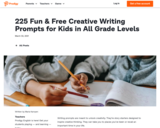
Writing prompts for kids help students:
- Express themselves and their creativity
- Grasp lifelong literacy skills and concepts
- Tell their own stories and build self-confidence
- Develop a growth mindset when it comes to their writing skills
- Writing is like a muscle — it takes practice to build up skills. Luckily, we put together a list of over 200 writing prompts to help your students get started.
Contents include:
- Creative writing prompts
- Fun writing prompts
- Persuasive writing prompts
- Social emotional learning journal prompts
- Math writing prompts

The picture you start your year with is not how it is going to end. Letting go of expectation. Changing your expectations and letting go.

Introduce core SEL competencies to teach students how to practice compassion and empathy, identify emotions, and exercise growth mindset.
Compassion is an important social-emotional skill that begins to develop in early childhood and is essential for lifelong health and success. Learning compassion increases a student's sense of wellbeing and improves the learning environment for all learners. By developing empathy in children, educators lay the groundwork for long-term understanding of diversity, equity and inclusion in the classroom(opens in new tab) and in life. Compassion education is important(opens in new tab) because it helps to build key social-emotional learning competencies, such as:
- development of the understanding of self
- social awareness, and
- relationship skills
With interactive online activities and robust offline lesson plans, The Compassion Project provides invaluable resources for teaching empathy in the classroom. The Lower Elementary Compassion Course has three online lessons; Compassion Playground, EmpathEyes, and Mindful Maze.
Sun West School Division: To access The Compassion Project: Lower Elementary, log into EVERFI through your clever account.
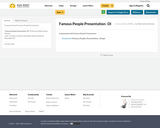
A powerpoint with Famous People Presentations.
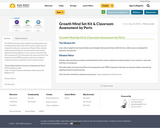
The Mindset Kit
Learn about adaptive learning mindsets and strategies that promote them with this free, online resource designed for educators and parents.
Mindset Meter
Quickly understand the prevalence and distribution of the various adaptive learning mindsets in your school or classroom with this surveying tool.
This information all comes from Perts from (www.perts.net). PERTS empowers educators to improve student outcomes by applying research-based practices.

Huge collection of graphics, videos, and links for supporting a growth mindset!
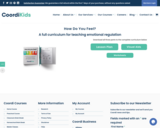
CoordiKids is happy to offer the series of downloadable tools for teachers: The How Do You Feel? Curriculum for teaching self-regulation to children.
How Do You Feel? is a curriculum designed for elementary school teachers. The kit is geared toward helping children ranging in ages from 4-12.
What’s Included: The How Do You Feel? Curriculum from CoordiKids
- The “How Do You Feel?” Chart
- 6 Lesson Plans
- Visual Aids
- Worksheets
- And more!
By clicking on the "Home" tab, you will also find:
- Home Course
- Preschool Course
- Classroom Brain Break Course
- Homeschool Brain Break Course
- Master Classes
- Starter Packs (Sensory Processing and Dyspraxia)
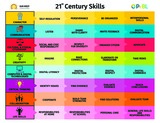
This resource provides ideas and supports for infusing 21st Century Skills into your classroom. The following 21st Century Skills are addressed:CharacterCollaborationCommunicationCreativitiyCritical ThinkingDigital & Computer TechnologiesCultural & Ethical CitizenshipLife Skills
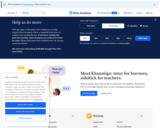
Watch. Practice. Learn almost anything for free.
Now with ELA!
*Math K-12 (including "get ready for grade X to prepare") + college level
*Computing
*Science
*Arts, Business & Humanities
*Reading & ELA
*Life Skills - growth mindset, AI, financial literacy, SEL, safety, career
*Economics

"In this self-paced email-based course you will learn the basics of learning mindsets, and the important role they can play in your own academic environment. Learn what they are, how to properly identify them, and what you can do to integrate them into your teaching, classroom, and school."
Change your mindset, change your life!
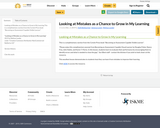
Looking at Mistakes as a Chance to Grow in My Learning
This is a complimentary section from the Corwin Press book "Becoming an Assessment Capable Visible Learner".

This assessment allows students and adults to explore if their mindset is fixed or a growth mindset.
This information could be useful when developing learner profiles for students.
This information could help provide the information needed to shift students from a fixed to a growth mindset in your classroom.

Carol Dweck
Lewis and Virginia Eaton Professor of Psychology, Department of Psychology, Stanford University
Carol Dweck's research shows that students' "mindsets about their intelligence"--whether they believe it is a fixed or a malleable quality--guide their motivation and learning. Dweck reveals how praising students' intelligence can undermine motivation and learning and how an intervention in the schools that changes students' mindsets creates rapid changes in their motivation and grades. Finally, she shows how the mindsets have broad application to business, sports, conflict resolution, and health.
The Lyle Lanier Lecture
Hosted by: Department of Psychology
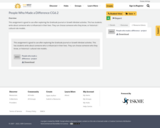
This assignment is good to use after exploring the Gratitude Journal or Growth Mindset activites. This has students write about someone who is influenciat in their lives. They can choose someone who they know, or historical / cultural role models.

I. Introduction ...............................................................................................................................................5
II. Understanding Competency-Based Education ...............................................................................9
A. Readiness for College, Career and Life: The Purpose of K-12 Public Education Today .................10
B. How Does Competency-Based Education Differ from the Traditional System of Education? .....12
C. Competency-Based Education and Personalized Learning Go Hand in Hand ................................22
III. Sixteen Quality Design Principles .....................................................................................................25
A. Purpose and Culture Design Principles ........................................................................................................30
#1 Purpose-Driven ...................................................................................................................................................... 31
#2 Commit to Equity ..................................................................................................................................................37
#3 Nurture a Culture of Learning and Inclusivity .................................................................................................41
#4 Foster the Development of a Growth Mindset ...............................................................................................45
#5 Cultivate Empowering and Distributed Leadership ........................................................................................48
B. Teaching and Learning Design Principles...................................................................................................53
#6 Base School Design and Pedagogy on Learning Sciences ...........................................................................54
#7 Activate Student Agency and Ownership ..........................................................................................................59
#8 Design for the Development of Rigorous Higher-Level Skills ......................................................................63
#9 Ensure Responsiveness .........................................................................................................................................66
C. Structure Design Principles .............................................................................................................................70
#10 Seek Intentionality and Alignment ....................................................................................................................71
#11 Establish Mechanisms to Ensure Consistency and Reliability .....................................................................77
#12 Maximize Transparency .......................................................................................................................................81
#13 Invest in Educators as Learners .........................................................................................................................87
#14 Increase Organizational Flexibility ....................................................................................................................92
#15 Develop Processes for Ongoing Continuous Improvement and Organizational Learning .................96
#16 Advance Upon Demonstrated Mastery ...........................................................................................................99
IV. Conclusion .............................................................................................................................................105
V. Glossary ...................................................................................................................................................107
VI. About the Authors .................................................................................................................................113
VII. Endnotes ..................................................................................................................................................115
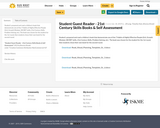
Student's prepared and read a children's book that demonstrate one of the 7 Habits of Highly Effective People (Grit, Growth Mindset, SECRET skills, 21st Century Skills, Problem Solving, etc). The book was chosen for the student for the 1st round, then students chose their own book for the second round.
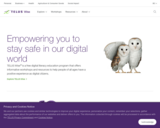
TELUS Wise helps Canadians stay safe in a digital world.
TELUS Wise® is a free digital literacy education program that offers informative workshops and resources to help Canadians of all ages have a positive experience as digital citizens.
TELUS Wise workshops and resources cover topics including protecting your online security, privacy, and reputation, rising above cyberbullying, and using technology responsibly.
This site offers a section called "TELUS Wise schools and teachers" that will help you in preparing your students for our digital world and future-proof today's youth by teaching important digital literacy and safety skills.

Using Yoda as an example of growth mindset. Carol Dweck, a psychology professor coined the term "growth mindset"